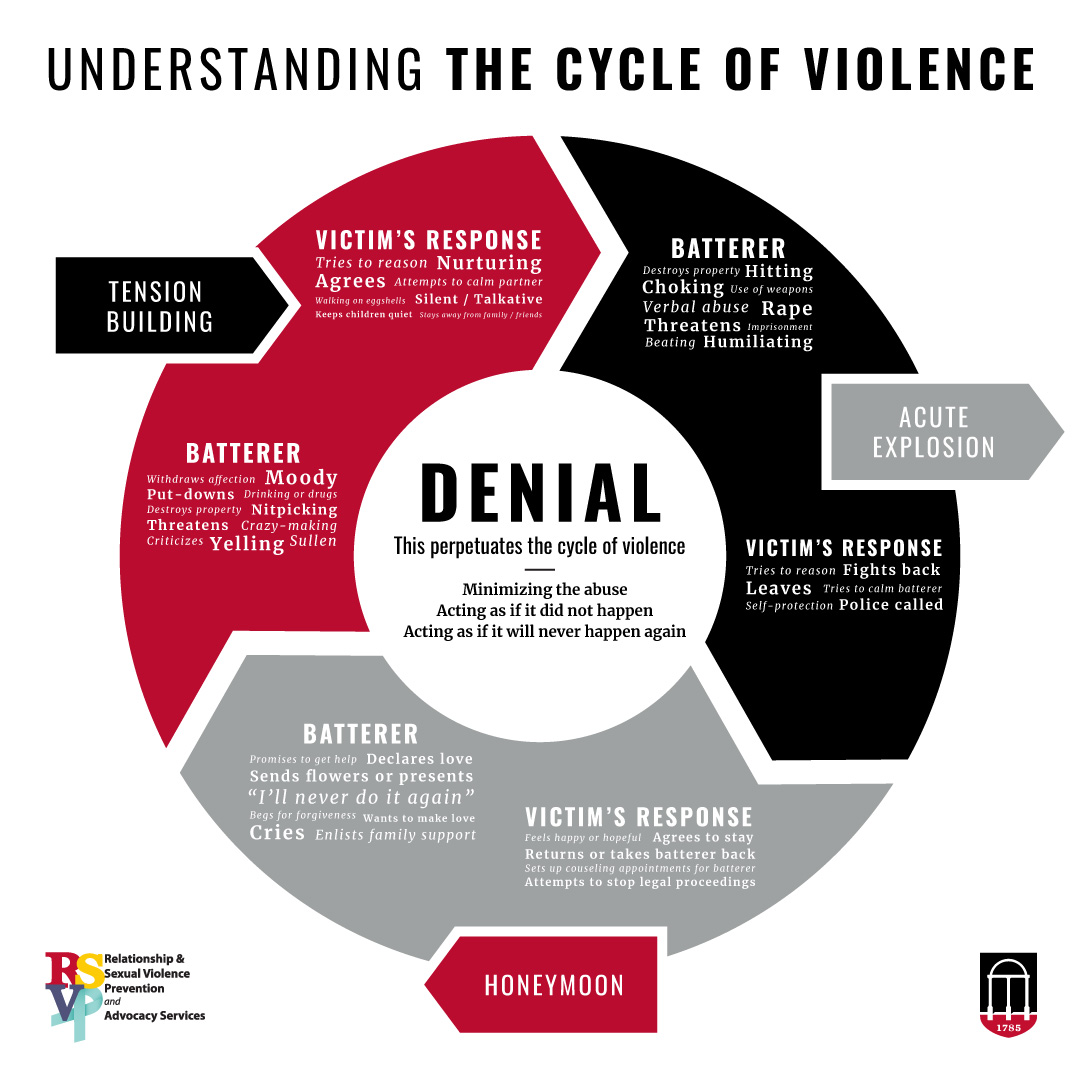Interpersonal Violence
Home » Relationship and Sexual Violence Prevention » Interpersonal Violence
Healthy Relationships
Healthy relationships are based on shared values, mutual respect, honesty, equality, fairness, and open communication. No one deserves anything less than that, and no one has the right to treat someone in ways that are less than that. They may or may not involve sexual activity. If partners choose to engage in sexual activity, it must be consensual.
Sexual activity should also be free of coercion, meaning someone is not making you feel obligated or forced to do something you don’t want to do. By definition, sexual coercion is “the act of using pressure, alcohol or drugs, or force to have sexual contact with someone against his or her will” and includes “persistent attempts to have sexual contact with someone who has already refused.”
In a healthy relationship, you should be comfortable speaking up if something is bothering you knowing you are able to come to a compromise if there is a disagreement. There is also respect for your partner and their privacy. It is important that each person is able to function as both an individual and as part of the couple. Having boundaries and a sense of independence allows each person to be themselves within the relationship, reducing the dependence on each other.
Healthy relationships are based on shared values, mutual respect, honesty, equality, fairness, and open communication. No one deserves anything less than that, and no one has the right to treat someone in ways that are less than that. They may or may not involve sexual activity. If partners choose to engage in sexual activity, it must be consensual.
Sexual activity should also be free of coercion, meaning someone is not making you feel obligated or forced to do something you don’t want to do. By definition, sexual coercion is “the act of using pressure, alcohol or drugs, or force to have sexual contact with someone against his or her will” and includes “persistent attempts to have sexual contact with someone who has already refused.”
In a healthy relationship, you should be comfortable speaking up if something is bothering you knowing you are able to come to a compromise if there is a disagreement. There is also respect for your partner and their privacy. It is important that each person is able to function as both an individual and as part of the couple. Having boundaries and a sense of independence allows each person to be themselves within the relationship, reducing the dependence on each other.
Definitions
Mutual Respect — Listening to one another’s ideas; treating each other well; supporting and being proud of each other; understanding each other’s boundaries
Trust — Having faith in each other’s decisions; understanding and accepting each other’s need to have independent activities
Honesty — Telling each other the truth without fear; feeling that you can truly be yourself
Equality — Treating each other as equals; giving and taking equally; making decisions together; compromising or recognizing the other’s perspective, even if you do not fully understand it
Fairness/Forgiveness — Both admitting when wrong; forgiving and moving past each other’s mistakes
Good Communication — Talking openly about your feelings, directly expressing needs and wishes; working through disagreements; listening without judgment. (Adapted from loveisrespect.org)
Mutual Respect — Listening to one another’s ideas; treating each other well; supporting and being proud of each other; understanding each other’s boundaries
Trust — Having faith in each other’s decisions; understanding and accepting each other’s need to have independent activities
Honesty — Telling each other the truth without fear; feeling that you can truly be yourself
Equality — Treating each other as equals; giving and taking equally; making decisions together; compromising or recognizing the other’s perspective, even if you do not fully understand it
Fairness/Forgiveness — Both admitting when wrong; forgiving and moving past each other’s mistakes
Good Communication — Talking openly about your feelings, directly expressing needs and wishes; working through disagreements; listening without judgment. (Adapted from loveisrespect.org)
Hurting (Abusive) Behaviors
Put-downs/insults
Isolation from family and friends
Controlling/authoritative decisions
Intimidation/threats
Extreme jealousy/possessiveness
Stalking behaviors
Physical/sexual abuse
Loving (Healthy) Behaviors
Respectful words/praise
Encouragement to spend time with others
Partnership/shared decisions
Kindness/safety
Respect for your wishes and feelings
Respect for your privacy and space
Respect for you and your body

